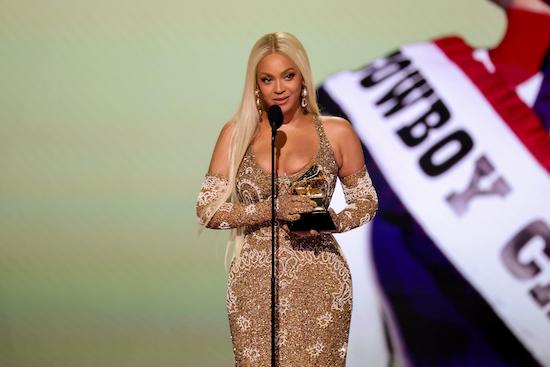
c/o Kevin Winer/Getty Images
In the run-up to the Recording Academy’s 67th Grammy Awards, there was plenty of online discourse around the night’s biggest category: Album of the Year. In a particularly contentious year, Beyoncé beat fierce competition with André 3000, Sabrina Carpenter, and Grammy favorite Billie Eilish for the prized award.
Though some critics favored Swift’s “The Tortured Poet’s Department” for the award, her album failed to make the cut despite the Recording Academy’s historical preference for the pop princess. Swift’s recent album was mediocre and failed to showcase her unique lyrical command (like in “Folklore”) or sonic mastery (like in “1989”). If Swift won the award, she would’ve broken her own record for most Album of the Year wins by a single artist, after claiming it previously with “Midnights” (2023). Despite addressing social issues such as female domesticity and Matty Healy, the album, on all grounds, was not her most successful.
The expectation for Swift to be awarded in these categories is a blatant display of the acclaim which white mediocrity garners, and the ability for white artists to dominate in music institutions through the consistent refusal of Academy voters to award Black artists.
Grammy nominations and wins not only distinguish artistic merit, but shape genre categorization, music discourse, and oftentimes the career successes of the artists they honor. The awards signal who should be favored in the institution of mainstream music. Artists like Brandi Carlile, Billie Eilish, and Olivia Rodrigo have become omnipresent in the music industry with the support of the Grammys, and it is an expectation that these artists will continue to define music culture.
However, pop music is—and will always be—a genre-blind term that encompasses all music dominant in mainstream culture. This term has been loosely used to describe all genres from the jazz music of the ’50s and hard rock from the ’80s. This ambiguity, however, has allowed the Recording Academy to set systemic barriers that permit white artists to continuously dominate what is deemed “pop music” and, consequently, what is considered popular. In the four main categories—Album of the Year, Record of the Year, Song of the Year, and Best New Artist—white artists almost always dominate the nominations and win the categories, and the Recording Academy often relegates the work of non-white artists to categories such as “Urban” and “Contemporary,” which have no inherent distinctiveness besides the artist’s ethnicity.
“I shouldn’t even be in this category,” Tyler the Creator said when accepting the award for Best Rap Album.
Other artists, like The Weeknd, Jay-Z, and Kanye West, have chosen to boycott the Grammy Awards at times throughout their careers to protest what they see as the blatant racism of the award process. Despite Beyoncé being the most awarded artist in Grammy history, only four of her awards are not in the category of “Urban” or “Contemporary.” This is another display of the Grammy’s ability to control the narrative around popular music and withhold the success and artistic excellence of Black artists.
This debate was highlighted in December 2023, when Beyoncé was awarded Billboard’s “Greatest Pop Star of the 21st Century.” Many fans, particularly Swifties, were furious, claiming that Taylor Swift’s chart success, award wins, and critical reception eclipsed those achieved by Beyoncé. This debate does not strictly center on talent, but raises questions about how we view art in both a critical and commercial sense, what we deem as popular music, and how we define artistic merit.
The music industry has groomed us to distinguish the music of white artists as inherently “pop,” and this categorization not only affects what we define as desirable and popular, but also what we applaud for artistic merit. The Recording Academy’s failure to award Black artists in these categories directly produces a culture that looks to white artists as emblems of musical excellence and cultural standards, thus influencing music fans to neglect the artistry of non-white musicians. The constant comparison of Beyoncé and Taylor Swift, and the ability of Swift to often dominate these conversations, are reflections of the discriminatory practices that the Recording Academy has perpetrated for decades.
Despite this history, Beyoncé’s win should not be viewed as an apology from the Recording Academy for their neglect throughout her multi-decade career. The win should be purely seen as an award for the merit and excellence of the album, one that is fully deserving of the Grammy’s top award.
Alexa, play American Requiem.
Carter Appleyard is a member of the Class of 2027 and can be reached at cappleyard@wesleyan.edu.